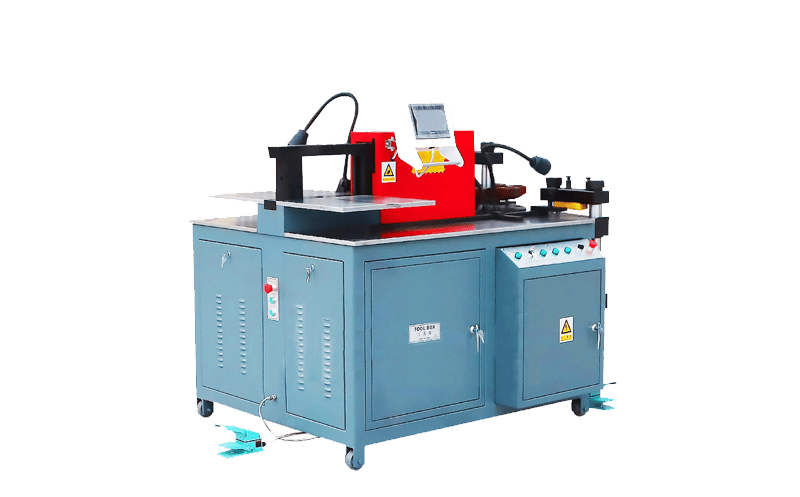Middle East Compliance Guide: A Must-See Safety Standard for Busbar Processing Machines for LV Switchgear Factories in Saudi Arabia/UAE
6/30/20255 min read


Understanding Busbar Processing Machines
Busbar processing machines play a crucial role in low voltage switchgear factories, facilitating the efficient handling and management of electrical distribution systems. These machines are designed to process busbars, which are metallic strips or bars that conduct electricity within various electrical systems, including industrial and commercial applications. The primary function of busbars is to collect and distribute electrical power from multiple sources to different circuits or components, effectively improving the reliability and efficiency of the electrical infrastructure.
The technology behind busbars involves sophisticated engineering to ensure optimal conductivity and minimal resistance. Typically made from copper or aluminum, busbars can be used in various configurations, depending on the requirements of the electrical system. Processing machines are equipped with features such as cutting, bending, drilling, and punching, enabling manufacturers to customize busbars to fit specific designs and applications. This level of customization is vital in addressing the varying sizes and forms needed for diverse electrical setups.
However, manufacturers in Saudi Arabia and the UAE face unique challenges when it comes to compliance and safety standards in the production of busbars. The region is governed by strict regulatory frameworks, stemming from both international standards and local guidelines, designed to ensure the safety and efficiency of electrical installations. Adhering to these standards is essential, as non-compliance can lead to significant repercussions, including financial penalties, increased liability risks, and potential hazards in electrical distribution systems.
Moreover, the rapid advancement of technology in the electrical sector requires facilities to continuously upgrade their processing capabilities while remaining compliant. This necessitates not only investment in modern busbar processing machines but also ongoing training for personnel to ensure adherence to safety protocols. Thus, manufacturers must stay vigilant and proactive in navigating the complexities of compliance while focusing on the delivery of high-quality busbars for low voltage switchgear applications.
Regulatory Framework in Saudi Arabia and the UAE
In the context of busbar processing machines utilized in low voltage (LV) switchgear manufacturing, both Saudi Arabia and the United Arab Emirates (UAE) maintain a comprehensive regulatory framework. This framework is designed to ensure safety, quality, and compliance within the electrical manufacturing sector. Key regulatory bodies, such as the Saudi Standards, Metrology and Quality Organization (SASO) in Saudi Arabia, and the Emirates Authority for Standardization and Metrology (ESMA) in the UAE, play a significant role in establishing and enforcing safety standards.
In Saudi Arabia, compliance with the local regulations set out by SASO is mandatory for all manufacturers. These regulations encompass a range of standards, including those specific to electrical safety and performance. The main objectives of these standards are to minimize the risk of electrical hazards, ensure efficient manufacturing processes, and promote the use of reliable busbar processing machines. The standards are frequently updated to align with international best practices, thereby enhancing safety across the industry.
Similarly, in the UAE, ESMA oversees the implementation of safety standards tailored specifically for the electrical sector. The organization collaborates with industry experts to ensure that the regulations address contemporary challenges and technological advancements. Furthermore, the UAE not only adopts local regulations but also integrates international standards, such as those from the International Electrotechnical Commission (IEC), to reinforce compliance and enhance safety in busbar processing. This dual approach facilitates a robust regulatory environment that supports both local initiatives and global safety benchmarks.
The role of government and industry bodies in both regions extends beyond regulation; they are vital in educating manufacturers about compliance requirements. Industry seminars and workshops are routinely organized, emphasizing the importance of adhering to safety standards in the operation of busbar processing machines. These collaborative initiatives significantly contribute to the safety and reliability of electrical manufacturing in Saudi Arabia and the UAE.
Key Safety Standards for Busbar Processing Machines
In low voltage switchgear factories, particularly in regions like Saudi Arabia and the UAE, adherence to specific safety standards for busbar processing machines is crucial. These machines play an essential role in the construction and assembly of electrical switchgear, and their safety standards are designed to protect both workers and the operational integrity of the machinery. Front and center among these standards are risk assessments that aim to identify, evaluate, and mitigate potential hazards associated with the machinery during its entire lifecycle.
The first component of the safety standards involves rigorous risk assessments. This process requires a thorough examination of the busbar processing machine’s operational environment and functions to detect any risks that could arise from mechanical failures or operator errors. Following the assessment, safety measures must be implemented based on identified risks, ensuring all potential hazards are adequately addressed.
Machine design requirements also constitute a significant portion of the safety standards. Busbar processing machines should comply with established design protocols aimed at minimizing risks, such as ensuring safety barriers are in place to protect operators from moving parts and electrical components. Furthermore, ergonomic design elements can help enhance operator safety and comfort, reducing the likelihood of accidents due to fatigue or improper posture during operation.
In addition to these design specifications, operational protocols are critical in maintaining safety standards. Factories must implement comprehensive training programs for machine operators, ensuring they are well-versed in the safe handling and operation of busbar processing machines. Regular maintenance checks are also essential, ensuring that all safety features are functioning as intended.
When comparing these safety standards to international norms, discrepancies may emerge that highlight best practices and areas requiring improvement. Adopting global safety standards can not only enhance worker safety but also improve the overall efficiency and reliability of busbar processing operations within the region.
Implementation and Best Practices for Compliance
Ensuring compliance with safety standards for busbar processing machines is essential for LV switchgear factories in Saudi Arabia and the UAE. The implementation process can be streamlined through a series of best practices that focus on training, maintenance, documentation, and the overall working environment. To begin with, employee training is paramount. It is vital that all staff members are well-versed in the operating procedures and safety protocols pertinent to busbar processing machines. Regular training sessions can familiarize employees with the latest regulations and equipment advancements, fostering a culture of safety awareness. Training can incorporate both theoretical knowledge and practical exercises to ensure comprehensive understanding.
Regular maintenance of machinery is another crucial aspect of compliance. It is advisable to establish a routine maintenance schedule, which includes inspections and servicing of busbar processing machines. This ensures that any potential issues are identified and rectified before they lead to accidents or operational breakdowns. Maintaining machinery not only protects employees but also extends the lifespan of equipment, significantly enhancing operational efficiency.
Thorough documentation processes are vital for effective compliance tracking. Factories should adopt a systematic approach to documenting training, maintenance, and compliance checks. This documentation serves multiple purposes: it is a record of compliance for audits, a guide for future training, and a reference for addressing any compliance-related inquiries. In addition, maintaining a clear and organized operational environment can significantly enhance safety. Factories should prioritize cleanliness and proper organization, ensuring that all safety equipment is accessible and that work areas are free from hazards.
In examining successful case studies within the region, several factories have demonstrated the effectiveness of these practices. For example, a factory in Abu Dhabi implemented a comprehensive training program that resulted in a reduction in workplace accidents by 30% within a year. Such examples highlight the impact of dedicated compliance efforts in enhancing safety and operational excellence.
Innovate
Leading manufacturer of busbar processing equipment solutions.
Contact
Support
+131 2713 4627
© 2025. All rights reserved.
